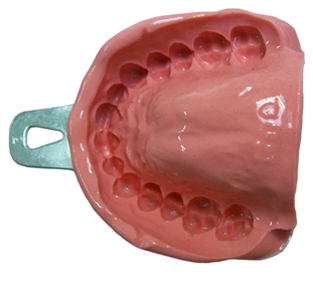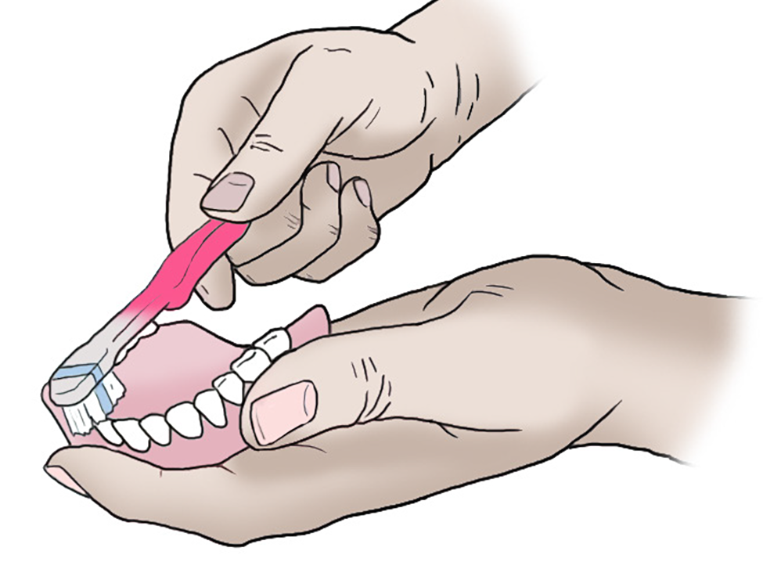What is an immediate denture?
An immediate denture is a type of denture which is made to replace teeth which are to be lost. They can be used to replace one tooth or many teeth. The denture is made prior to the extraction of the teeth and fitted immediately after removal of the teeth. This has the benefit of minimising changes to appearance.
What is the denture made of?
Dentures are most commonly made of acrylic; a hard plastic-like material.
How is an immediate denture made?
An impression is taken of the mouth before the teeth are removed. A model is made from this impression and the denture is then made on this by the dental technician.

This takes at least a few days. An appointment is made to extract the teeth and the denture is fitted at the same appointment.
What happens after the denture is fitted?
For the first 24 hours you should not remove the dentures. If you do it may be difficult to fit them back into your mouth, as there may be a some swelling around where the tooth or teeth have been removed.
An appointment will normally be booked for a review a few days after your denture is fitted. At this visit the dentist will remove the denture to clean it and adjust any areas which are causing soreness.
Your dentist will then make further appointments to review your dentures and adjust as necessary.
Back to topHow do I look after my dentures?
Brush your dentures at least twice a day, using soap and a soft toothbrush, over a sink of water in case you drop them. Toothpaste (such as Dentu-Creme©) can be used instead of soap but ensure not to use an abrasive (gritty) toothpaste as these can damage your dentures. Make sure you clean all surfaces of your dentures including those which touch your gums.

- Your denture should be soaked, at least twice a week, in a denture cleaner such as Dentural©, to help keep them clean and prevent fungal infections.
- At other times when your denture is not being worn it should be stored in water. Always brush your denture prior to soaking to get rid of any debris.
- Whichever product you use always follow the manufacturer’s instructions.
- Do not soak the dentures in hot water as this can cause them to change shape and discolour.
What are the problems which can occur with immediate dentures?
As the dentures are made on models of your mouth made prior to the extraction of your teeth, there has to be some guesswork involved in their construction and they will often require some modification at the time of fit.
When teeth are extracted, the bone and gum that held the teeth in place alters shape. These changes happen most rapidly in the first few months. Your dentists may suggest that a lining material be added to your denture to improve the fit during this period of healing.
As a result of the changes to the shape of your mouth, due to healing, immediate dentures are normally replaced once this healing is complete.
Should I wear my dentures at night?
Your dentures should usually be taken out before you sleep, to allow your gums a period of rest. Your dentist may however recommend that you wear your immediate denture at night for the first few days after it is fitted. Wearing your dentures at night for long periods can lead to problems such as fungal infections developing beneath the dentures. Taking them out also allows time for you to soak your dentures.
What challenges may I face with my immediate dentures?
Dentures will never be the same as your natural teeth. It will take time to adjust to wearing your dentures and it is not unusual to experience some difficulties in the first few weeks of wearing them.
You may find when the dentures are first fitted:
- You have more saliva in your mouth than usual and the dentures may feel big and bulky. This will generally settle over time
- Speech is affected initially and you could have a lisp for a few days whilst you adjust to the dentures
- Eating can be difficult to begin with. Try starting with small amounts of non- sticky foods and eating on both sides of the mouth
What if my dentures cause soreness?
Sore spots in the mouth are common when you first start wearing your dentures.
Your dentist will arrange to see you again after fitting your dentures, to adjust any areas which may be uncomfortable and discuss how you are managing with them.
Where possible, we ask you to keep wearing your dentures as much as you can, in order to help us identify problem areas and make appropriate adjustments.
If you are unable to wear your dentures, take them out, but ensure that you put them in at least 24 hours before your review appointment to enable you and your dentist to recognise the areas which are sore.
What are the alternatives to immediate dentures?
The main alternative to immediate dentures is to have the tooth or teeth extracted, allow time for healing (usually 3 – 6 months) and then construct a denture.
Do I still need to visit the dentist once I am happy with my dentures?
Yes. Visit your dentist as often as they recommend. Regular check ups are important to check the health of your remaining teeth and gums, as well as the health of your mouth. As explained above, immediate dentures should be considered temporary and will very often require replacement. When they should be replaced can be decided by you and your dentist at check up appointments. Ongoing treatment is not normally provided at the Dental Institute, so it is important to find your own dentist once your treatment here is complete. You should wait no longer than 6 months to see a dentist following the fitting of your immediate denture.
Back to top